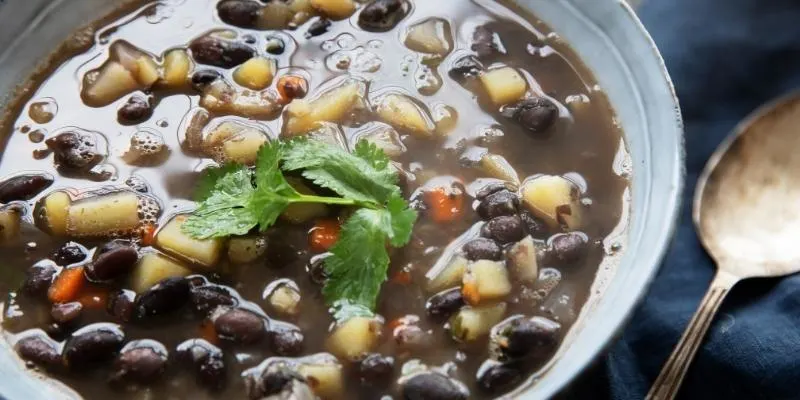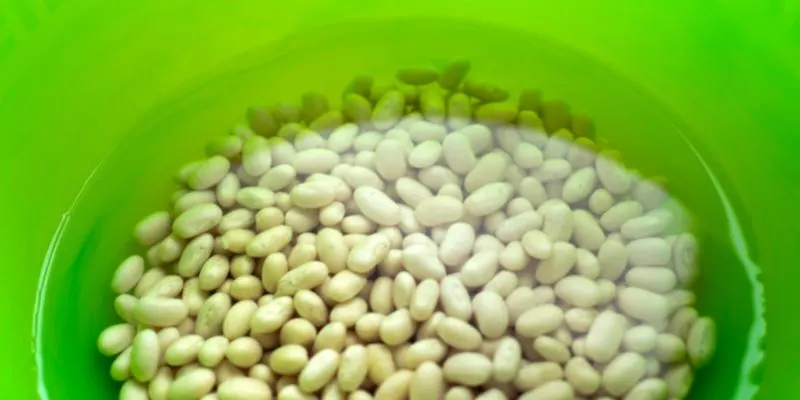Beans, absolutely filling and delicious, but they don’t sit well with everyone. If you’re someone who likes beans (I do!) then you know that cooking your own beans, from dry, is a whole other story than canned beans. Oh canned beans are amazing in a pinch ad they save you so much time! But I feel they’re missing and extra oomph that dried beans do have.
One other thing dried beans have: the occasional inability to soften. Sometimes the same batch of dried beans cooks amazingly today, and doesn’t soften at all next month. So what gives ? Why do beans sometimes stay hard, and sometimes soften just right ? Can you eat undercooked beans ? We’ve all been there. So let’s find out what’s wrong with them.

Why are my beans still hard after cooking ?
If your beans are still hard after cooking them for 2 whole ours, it’s usually the beans, not you. Most beans will cook in 2 hours, even if you didn’t soak them overnight (but soaking does help immensely). But beans that have simply dried out too much, and are too old will just not soften all the way through. What’s worse is very often you’ll find mixed bags, with younger and older beans in the same bag so some will soften and some won’t. There’s nothing you can do to soften very old beans.
Will old beans ever soften ?
Very old beans will not soften all the way through, no matter how long you’ve cooked them. You can try giving them another hour, if you have the patience and if it makes sense for the situation, but don’t expect a miracle. I’ve learned the hard (haha) way that hard old beans can’t be helped and I can either cook another batch with a different bag, or pop open a can of beans. Those will always be cooked through perfectly.
Read also: Why Are Green Beans Stringy And Squeaky ?
Can you eat undercooked beans ?
Undercooked beans shouldn’t be eaten, since it’s not clear how cooked or undercooked they are. Their undercooked parts will give you far more gas and digestive issues than fully cooked soft beans. And if you’re making kidney beans, definitely be sure to not eat them if they’re undercooked.
Why are raw kidney beans toxic ?
All beans contain a protein called lectin, which needs to break down during cooking time, otherwise it becomes toxic. Specifically it can damage the cells in your gut lining, leading to diarrhea and vomiting. Kidney beans have the highest amount of lectin. When the beans are still raw or not cooked all they way through, the lectin is still in high amounts.
Once you cook the beans all the way through, the lectin breaks down significantly and your gut has a much better chance at digesting them. So kidney beans aren’t toxic, as long as they’re fully cooked through. They’re not the only beans that contain lectin, but they contain the most.
Tips on softening beans so they cook well
If you’re going to cook dried beans there are a few things you definitely need to do. These tips will help you do the most you can to get the beans to soften, but they may still fail on very old beans.
Always soak your beans overnight in cold water
All dried beans will benefit greatly from an overnight soak in cold water. Rinse the dried beans under cold running water, drain, then put them in a bowl. Add at least double the amount of water that you added beans. So for each cup of dried beans add 2 cups of water. You’re going to need a big bowl. Only use cold water, don’t use hot water for this. This is a long, slow process. Start this in the evening before cooking, leave the bowl covered overnight on the counter.

In the morning check on your beans. Some may still be floating, those usually have the skins a bit loose and have air trapped. It’s up to you if you want to keep the floaters or not, I usually discard them. You’ll also notice the beans have almost doubled in size. This is the result of rehydration, and it will make cooking the beans much easier and faster.
Black eyes peas don’t need to be soaked but they absolutely should, just to hedge your bets. Do the most you can when it comes to pre-cooking prep because once the beans are simmering there’s nothing you can do but wait.
Don’t keep your dry beans for months on end
If you’ve bought a big bag of beans and it’s beans and it’s been sitting in your cupboard for a few months, it may or may not be still good. I don’t mean spoiled, I mean it might’ve become too old to soften. When you buy beans, you don’t know how long they’ve been sitting on the shelves. They were great when first packaged, but sitting on a shelf for 4 months doesn’t get the any younger (or softer). Add to that the amount of time they’ve been in your cupboard and you might have yourself some very old beans.
The fix ? Either buy your dried beans in the same week you’re going to use them, or get some backup canned beans in case the dried ones don’t cook through.
Read also: Can You Eat Raw Parsnip?
Allow more cooking time if you have hard water
Do you have hard water ? It’s going to impact your cooking time, because it makes water harder to boil and doesn’t soften foods as much. You can still cook with it, it’s just going to take a few minutes longer. So if you’re used to cooking dried beans for 2 hours for perfection, allow them 2.5 hours, just to be sure.
Or, if you’re feeling like experimenting a bit you can add a bit of baking soda to your hard water. It will create a basic (alkaline) environment, so the beans will cook faster. You can add it to the soaking water or the boiling water, but remember to add just an small amount. The usual amount is 1 teaspoon (not tablespoon!) of baking soda for each full cup of dried beans you’re going to cook. So half a teaspoon if cooking half a cup, and so on.
There’s also the added benefit of reduced gas after eating beans soaked/cooked with a bit of baking soda, and shorter cooking time. However you should still check/taste the food as you cook. Don’t rely just on timing alone, half the time the amount of time required for a recipe (of any sort) is skewed by humidity, temperature, amount of food in the pot, amount of liquid, how tough the ingredients are, and so on. Always taste as you go.

